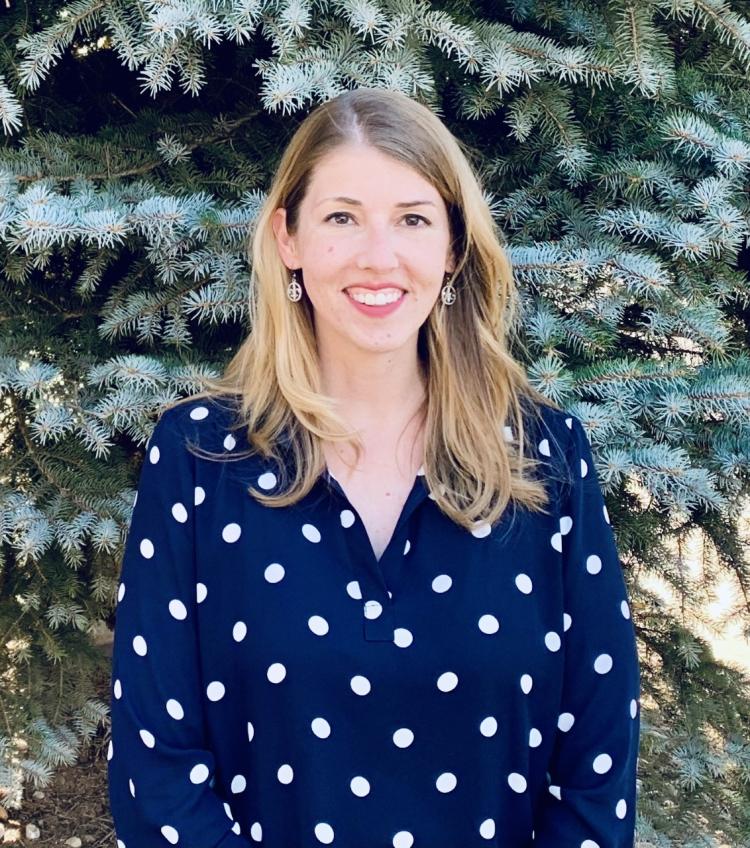Chemistry instructor recognized for creating connections
The Department of Chemistry’s Ellen Broering is one of 2021’s Marinus Smith award winners for her work improving students’ experiences—even online
The past year’s rapid shift to online learning challenged many professors’ ability to connect with students. However, Ellen Broering, an instructor in the University of Colorado Boulder’s Department of Chemistry, fostered a sense of recognition and care, and her students and their families took notice.
Broering, who began teaching at CU Boulder in fall 2020, was recently honored as one of 2021’s winners of the Marinus Smith award. The honor, which is conferred by CU Boulder’s New Student and Family Programs office, recognizes faculty and staff members who improve students’ experiences through their teaching, mentorship, support and service.
Jenny Deschane, a parent, wrote the nomination in which she commends Broering’s ability to create a sense of connection with her students:
"Dr. Broering has worked hard to make sure her students understand the subject matter, feel connected to her and feel connected to each other. ... As a parent, I cannot express my gratitude towards Dr. Broering for working so hard to teach and connect with her students."

Ellen Broering
Creating a sense of personal connection
Broering’s interest in student mentorship and creating a classroom environment in which students feel recognized follows her own positive undergraduate experiences connecting with faculty.
“I went to a small private college in south Alabama, Spring Hill College, and I was really close with teachers and advisors—it was not a school where you can be anonymous,” says Broering. “Having your professors know who you are, know your goals and, at least, know your name—that’s something that is really important to me and that I try to recreate.
As she pursued her PhD in chemistry at the University of Georgia, Broering’s worked to recreate those undergraduate experiences, even in much larger classes.
In one of her final semesters of graduate school, she found inspiration studying CU Boulder’s Learning Assistant Program and hearing a guest lecture from Valerie Otero, professor of STEM education in CU Boulder’s School of Education.
“That really got me thinking about the way you manage large classrooms when you have 350 students,” says Broering. “I started to ask, ‘How do you create an environment that’s welcoming in a course that has a stigma against it of being known as a weed-out class when it’s not?’”
Meeting the challenges of online learning
Broering’s approach, though, was tested during her first year teaching chemistry this past year at CU Boulder.
“If this were a normal semester and I had a class of 200 students, I would at least know 100 names,” says Broering. “That is what has been really challenging with COVID. I want to see people face to face and recognize their faces. I don't really get that interaction opportunity when we are online.”
Broering is quick to acknowledge her fellow teaching faculty, Christine Kelly, instructor emeritus of chemistry, and Nabilah Rontu Carlon, instructor of chemistry. Together, they met COVID-19’s challenges by designing a course in which students are given a variety of opportunities to learn the material, apply theories and gain foundational problem-solving skills that prepare them for their exams.
One unexpected challenge of online learning came from the need to regularly create a variety of new questions and problems for homework and exams. While large textbook publishers offer question banks that include several thousand examples, in an online environment, these can be quickly Googled.
“We still did all of the analysis that normally comes into examining test questions—we looked at the homework problems that give people trouble and saw what types of questions people struggled with in office hours,” says Broering. “I have learned a lot from Christine and Nabilah, and I feel like I have improved in writing test questions and testing one thing at a time, which is important to me.”
It was incredibly gratifying to hear that I made a really difficult first year of college just a little bit better by knowing someone's name and having that personal back and forth.”
Getting back to an in-person classroom experience.
This fall, Broering will teach sections of general chemistry and inorganic chemistry, both of which will be taught in-person.
“I am looking forward to the give and take of what I want the classroom to be—where I talk for a little bit and then let the silence work.”
While the 2020-21 academic year was filled with frustrations around the degree to which students learned concepts and engaged with opportunities, Broering commented, reading Jenny Deschane’s award nomination made those challenges feel worthwhile.
“It was incredibly gratifying to hear that I made a really difficult first year of college just a little bit better by knowing someone's name and having that personal back and forth.”

